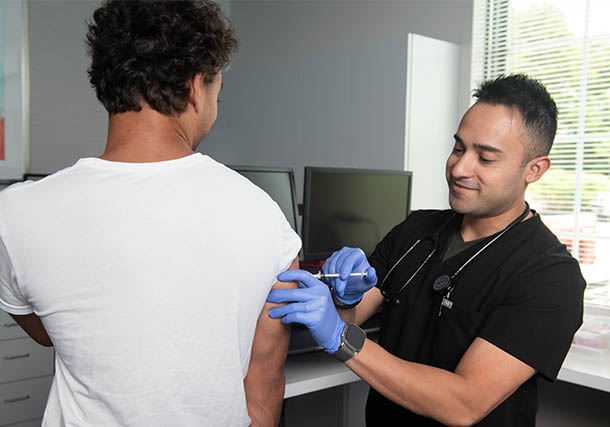
Pollen Allergy Treatment in Charlotte
A pollen allergy can be a frustrating and inconvenient condition for many individuals, especially during the season when pollen count is at its highest. At Carolina Asthma & Allergy Center, we understand the impact that a pollen allergy can have on your lifestyle and well-being, and we are committed to providing comprehensive care to help manage and treat this condition.
Our team of board-certified allergists and experienced healthcare professionals is dedicated to providing personalized treatment plans and ongoing support to help you live your life to the fullest. Whether you are seeking a diagnosis, treatment, or ongoing management of your pollen allergy so you cna get outside and enjoy the air, we are here to help you every step of the way.
Jump Ahead:
- How to Request an Appointment
- What are Pollen Allergies?
- What are Different Types of Pollen Allergies?
- What are the Symptoms of Pollen Allergies?
- How Can Pollen Allergies Be Diagnosed?
- Pollen Allergy Treatment in Charlotte
- How Can Exposure to Pollen Allergies Be Reduced?
- When Should You See a Doctor?
- Pollen Allergy FAQs
How to Request an Appointment
At Carolina Asthma and Allergy Center, we offer comprehensive evaluation and treatment for pollen allergies. If you suspect you may have a pollen allergy or have experienced seasonal symptoms, you can request an appointment with our team of board-certified allergists and experienced healthcare professionals.
To schedule an appointment, you can call our office or fill out the online appointment request form on our website. Our friendly staff will work with you to find a convenient date and time for your visit.
During your appointment, our allergists will review your medical history, perform a physical exam, and conduct any necessary tests to determine if you have a pollen allergy. Based on your evaluation, our team will develop a personalized treatment plan to help manage your symptoms and prevent future allergic reactions, especially during seasons when pollen is at its highest.
What are Pollen Allergies?
During the spring and on into the summer and fall, plants start releasing tiny grains of pollen, which is a very fine powder. They’re designed to help fertilize other plants, but these tiny pollen grains are lightweight and small enough to travel via the wind, as well as via birds, insects, and other animals.
Unfortunately, when you breathe in this pollen, your body may view it as a threat, which triggers the immune system and can cause an allergic reaction. For some people, even a few grains of pollen are enough to provoke a reaction.
Inhaling pollen releases water-soluble proteins onto the lining of the respiratory system. Usually, those proteins are harmless. However, they can be mistaken by the body for harmful substances. When this occurs, the body reacts to the perceived threat by creating substances called IgE antibodies. They attach to mast cells within the body, which release histamine, the substance responsible for the symptoms of allergies.

What are Different Types of Pollen Allergies?
Various types of pollen exist and may affect people differently. Some of the common types of pollen allergies include:
- Trees such as oak, cedar, or birch
- Grasses such as Timothy or Bermuda
- Weeds such as ragweed or pigweed
The most common pollen allergy is to grass. However, everyone reacts differently, and some individuals may have symptoms when trees begin to flower, while others may deal with worsening symptoms when grasses begin growing.
Some individuals with pollen allergies may find that they are sensitive to certain types of foods, a condition called oral allergy syndrome. It’s important to talk to your allergist about how your pollen allergies could impact the foods you eat.
What are the Symptoms of Pollen Allergies?
People with a pollen allergy who inhale pollen, experience symptoms such as:
- Itchy eyes
- Wheezing
- Sneezing
- Itchy throat
- Runny nose
- Nasal congestion
- Watery eyes
- Swelling and redness around the eyes
- Itchy nose, mouth, or ears
For people who have asthma, pollen may aggravate asthma symptoms and lead to wheezing, cough, shortness of breath, or chest tightness.
How Can Pollen Allergies Be Diagnosed?
Typically, two different tests are used by allergists to diagnose pollen allergies depending on what’s right for you and your symptoms.
Skin Prick Test (SPT)
The skin prick test involves placing a small drop of a potential allergen on the skin, then lightly scratching or pricking that spot with a plastic device. Within 15-20 minutes, if you’re allergic to the substance being tested, a small itchy wheal or “hive” will appear at the site of the test. The larger the wheal, the more likely you are allergic to that allergen. In some cases, skin prick testing may be followed by intradermal testing for confirmation. Intradermal testing involves placing a small amount of diluted allergen under the skin using a tiny needle. A similar reaction occurs after 15-20 minutes if you are sensitive to the allergen being tested.
Just remember, a positive reaction to an allergen doesn’t always mean you have an allergy. Your allergist can help determine whether a positive test is clinically relevant.
Specific IgE Blood Test
If you’re taking medicines or have a skin condition that may interfere with the skin prick test, blood tests may be helpful. These tests involve giving a blood sample, which is sent to a lab. The lab adds the allergen to the blood sample and measures the antibodies against that particular allergen in the blood sample.
Pollen Allergy Treatment in Charlotte
A variety of different treatments may be used to help treat the symptoms of a pollen allergy. These include allergy medications, allergy shots, and sublingual immunotherapy, or allergy tablets, any of which may be right for you depending on the severity of your symptoms.
Allergy Medications
Medicines, both over the counter and prescription, often help reduce the symptoms of pollen allergies. Some popular medications include:
- Antihistamines, which combat the histamine production that occurs with an allergic reaction, are one of the most common treatments and come in pill, liquid, or nasal spray form
- Nasal corticosteroids are a type of nasal spray that can block allergic reactions and reduce inflammation in the nose, and are extremely effective for allergic rhinitis since they reduce all symptoms and have few side effects.
- Decongestants, which come in nasal spray, drop, liquid, or pill form, help shrink the lining of your nasal passages to relieve nasal congestion
- Cromolyn sodium is a type of nasal spray that blocks leukotrienes and histamines, which cause allergy systems
- Leukotriene receptor antagonists help block chemicals other than histamines that help create allergic reactions
Allergy Shots
Allergy shots, which are called subcutaneous immunotherapy, have been very well studied and have been used for decades to help provide relief from and potentially cure pollen allergies. This involves a series of injections that contain larger and larger amounts of a specific allergen to help improve symptoms over time by teaching the immune system to become tolerant to that allergen.
Sublingual Immunotherapy
Like allergy shots, sublingual immunotherapy treatment uses tablets containing allergens that are placed beneath the tongue for a minute or two before being swallowed.
How Can Exposure to Pollen Triggers Be Reduced?
Beyond taking medications to treat seasonal allergies, you can take measures to reduce exposure, prevent symptoms, or treat your allergy with home remedies.
Ways to reduce your exposure to pollen include:
- Delegating tasks like pulling weeds or mowing the lawn to others to avoid contact with allergens
- Avoiding hanging laundry outdoors as pollen may stick to towels and sheets
- Staying indoors when it’s windy and dry, as it’s better to go outside after it rains since rain helps clear the pollen from the air
- Removing clothing and shower after being outdoors to remove pollen
- Wearing a pollen mask if you’re doing outdoor chores
Additional Steps to Take When There’s a High Pollen Count
When there’s a high pollen count outside (you can often check with your local weather channel), take additional steps to reduce exposure.
- Check your local forecast, radio station, TV or CAAC’s website for the current pollen level and the pollen forecast
- Take allergy medicines before symptoms occur if there are high pollen counts
- Avoid being outdoors in the morning when the pollen counts are generally highest, as this is when most people experience their worst morning allergies
- Close windows and doors at night or at any time when the pollen counts become high, as allergies at night can worsen when pollen enters your bedroom
Clean Indoor Air
While it’s difficult to eliminate all allergens from your indoor air, a few tips that may help include:
- Using a dehumidifier to keep indoor air dry
- Using the air conditioning in your car and home
- Installing high-efficiency filters if you have air conditioning or forced-air heating
- Changing the filters regularly
- Cleaning your floors often with a vacuum that includes a HEPA filter
- Putting a high-efficiency air filter in your bedroom
When Should You See a Doctor for Your Pollen Allergies?
If you’re not sure what’s causing your allergies, or if your allergy symptoms are interrupting your daily life, it might be time to see an allergist. Allergists are specially trained to help patients diagnose and treat allergies and other immune issues.
Summary
At Carolina Asthma and Allergy Center, we are dedicated to providing compassionate care and ongoing support to help you live your life to the fullest. Contact us today to request an appointment and take the first step towards managing your pollen allergy.
Pollen Allergy FAQs
How do you know if you are allergic to pollen?
You may be allergic to pollen if you have symptoms like watery eyes or a runny nose around the same time every year. However, only a doctor can diagnose a pollen allergy, which is done using a skin prick test or a blood test called a Specific IgE Blood Test.
How long do pollen allergies last?
Seasonal pollen allergies generally last around three months. According to Cleveland Clinic, tree pollen season usually lasts between March and May, grass pollen season from mid-May to July, and ragweed season between mid-August and the first frost.
What are the different types of pollen allergies?
The most common types of pollen allergies are tree, grass, and weed allergies. Tree pollen allergies commonly include oak pollen or birch pollen. Grass pollen allergies tend to be some of the most stubborn. And the most common weed allergy is ragweed.
Why does pollen cause allergies?
In individuals with pollen allergies, when pollen is breathed in through the respiratory system, the immune system thinks the pollen is a danger to the body. It starts making chemicals to fight the pollen, causing an allergic reaction. Histamines released as a part of this reaction lead to the symptoms of allergies like a stuffy nose, watery eyes, and sneezing.



